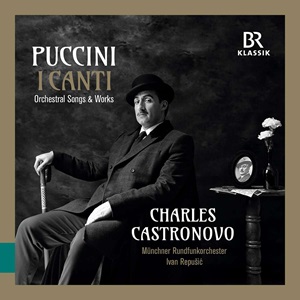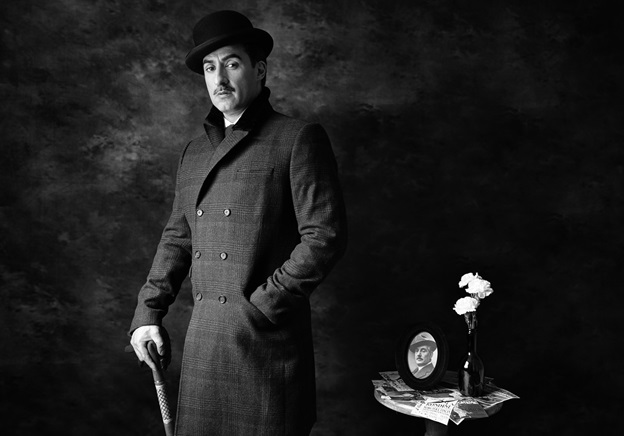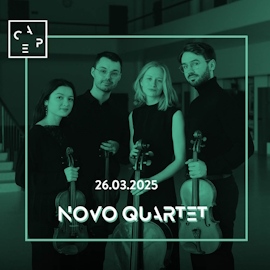What distinguishes a Puccini aria from a Puccini song?
I think the main thing that really distinguishes an aria from a song in Puccini would be the intimacy. Although there are many arias in some of Puccini’s operas that are intimate and personal in nature, I would say for the most part they are more on the grand scale. The songs lend themselves more to an intimate kind of setting and even though there are a few selections with some bigger phrases or a couple high notes, I would say that they’re mostly built around the idea that they are more like a parlor type of song, which can be performed amongst a roomful of friends. So, I think intimacy and a little bit more the smaller and intimate scale is definitely the main difference you would get between Puccini’s songs and his arias.
 Puccini’s songs can be separated into four periods; his early years, the Milan Conservatory years, songs from 1888-1899, and his mature style period. This affects above all, I think, the quality of the piano accompaniment. Do you think that the orchestration has given a more equal quality to the accompaniment?
Puccini’s songs can be separated into four periods; his early years, the Milan Conservatory years, songs from 1888-1899, and his mature style period. This affects above all, I think, the quality of the piano accompaniment. Do you think that the orchestration has given a more equal quality to the accompaniment?
I do believe that the arrangements in our case with the world premiere of the orchestrated songs really do a lot of justice, not just to the style of Puccini, but in my opinion, also to the kind of color, flavor and the personality of Puccini. I think Johannes X. Schachtner did an amazing job without overdoing it or under doing it. It’s so well balanced in the orchestra now and I believe Puccini would have actually loved it. It’s very much in the vein of what we would imagine he would do. I think also keeping still with the idea that it’s not over dramatic, it’s not for the stage – in a sense – they are just songs. I think we have accomplished altogether the right balance with these great orchestrations. I believe that the quality has been improved in the sense that there are more colors now.
What changes for the singer when he has to do orchestrations instead of piano?
I’m sorry I am continuing with the same phrase the whole time: the nature of the songs is for me more intimate and more personal. I didn’t make a huge difference in the approach now that they have been orchestrated. There are – of course – a few moments that are more aria-like and we have some melodies that Puccini later used for arias – especially tenor arias. There are obviously some songs that are bigger and a little bit more bombastic or dramatic in a way, so I sang with a bit more of my stage voice with those ones and then on some of the other ones I was really able to come back and sing very lightly. The main thing in a recording that one can always improve and learn from is: every time you record, you can do things much more subtly than you normally could do on a stage since the microphone is close by. The difference with the orchestration didn’t change my approach in the recording studio, except that I needed to remind myself that I wasn’t on the big stage the whole time but could do trust to smaller details.
Puccini’s songs vary widely in their level of difficulty and ranges. So what are the challenges for the singer?
Well, I couldn’t speak for every singer and their challenges with Puccini, but for me, most of the time I tend to be an emotional singer, I usually think about emotion more than about technique. With Puccini it’s very easy to get over emotional because of the music and the subject matter, because Puccini´s way to write music, which lends itself to becoming quite emotional. So my biggest challenge with Puccini even in these songs is to find a good balance between giving the emotion, yet keeping it where it´s still in the right form so it doesn’t get in any way vulgar or sloppy. So always elegant but with a lot of emotion. For me that’s the biggest challenge, especially with the songs, as they are mostly smaller in scale in most cases. That’s the challenge: staying elegant a while showing a lot of emotion.
It has been said that the songs can provide a student singer with valuable training. Do you agree with such s statement?
Yes, it’s a very valuable training, not just for students but for singers of all levels – even as you are getting older and may have had a long career. I noticed that a lot of great singers also turn to singing more Lieder and songs as their career continues. I think it’s a reminder of the huge scale of singing. You can go from the huge dramatic parts on stage… death, revenge, murder, to the smallest kind of poetic moments about nature, love and so on. So, it’s a great exercise at any time for a singer to be able to flex all of those artistic muscles – the big dramatic theatrical ones and the small, very poignant and moving tiny moments.
I have to remind myself very often because I mostly sing roles on stage and although there are many smaller moments on stage, they are usually a bit bigger in gesture and intention. It’s actually quite revealing when I do art song or Lieder or anything after singing a lot of opera roles, I have to take a whole day to just remind myself that I can do much, much less. So it’s a great exercise and it’s a very valuable to anyone at any level.
Which one of the songs on this album is your favorite and why?
My favorite song on the album is hard to choose but I would say it´s Storiella d’amore. There’s something about this song that’s very charming to me. It just of kind of gets me in the heart. There’s the melody, the changes of the time and of the rhythm. In the different sections it’s slower, it’s a little bit mysterious and then it becomes quite positive. It also has a very good structure. It has the intro, a verse, a little middle section, then another verse and the ending section. I think it’s like a little gem. It’s Wonderful. I love this piece. The words are very beautiful and it’s kind of a positive message. I find it very poignant, very beautiful. This would be my favorite. Also vocally, you know, it stretches from the lower to higher notes in the range and everything in between. It’s quite legato but it has a lot of energy. You can’t sing it too slow. For me, it’s my favorite piece from the whole album.
Puccini-Lieder in passenden Orchestrierungen, exzellent gesungen von Charles Castronovo























